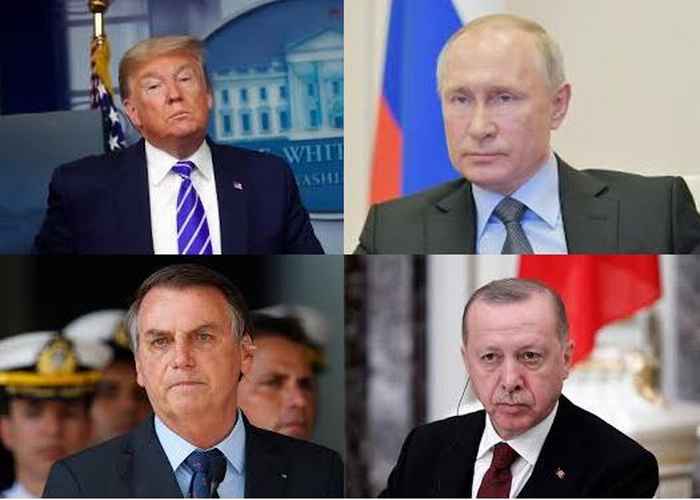Are strongmen a particular ‘breed’ of political figures?
8 June 2020

Autocratic political leaders in liberal democracies - like Trump in the USA, Putin in Russia, Erdoğan in Turkey, and Bolsonaro in Brasil- have all come to power through the ballot box. But they embody a shift towards autocracy and democratic deconsolidation by pushing for the centralization of executive power, hierarchical governance, muscular treatment of opponents and the media, and the promotion of traditionalism and nationalism. Are these strongmen a particular ‘breed’ of political figures?
Alessandro Nai of the University of Amsterdam and Emre Toros of the Hacettepe University in Ankara mapped the personality profiles of 157 leaders who competed in 81 elections worldwide between June 2016 and July 2019, including 14 leaders with autocratic tendencies.
‘The personality of political leaders matters for electoral outcomes and effective governance, so we ought to know more about when, and for whom some personality traits are more likely to be present or absent’, say Nai and Toros. ‘Looking at personality profiles could be a new way to understand the rise and success of strongmen worldwide.’
The Big Five and Dark Triad
Nai and Toros rely on two established personality inventories to map the personality profiles of political leaders. On the one hand they use the Big Five Inventory that describes five positive and 'socially desirable' personality traits: extraversion (sociability, energy, charisma), agreeableness (cooperative and pro-social behaviours, conflict avoidance and tolerance), conscientiousness (discipline, responsibility and a sense that life should be organized), emotional stability (calm, detachment, low emotional distress and anxiety), and openness (curiosity, a tendency to make new experiences).
On the other hand they map negative and potentially harmful traits through the Dark Triad inventory: narcissism (grandiosity, ego-reinforcement behaviours, tendency to seek attention and admiration), subclinical psychopathy (lack of remorse, insensitivity, impulsivity) and Machiavellianism (tendency to use manipulation and strategic behaviours).
Expert assessments of 1800+ experts
Measuring the personality of political elites and national leaders directly, through psychological assessments or via self-reported measures, is virtually impossible. Instead Nai and Toros assess the perceived personality of political leaders, via an expert survey that includes measures for the personality traits of 157 political leaders. The dataset is part of a broader research initiative that gathers information about elections worldwide, and is based on the ratings of more than 1800+ experts in politics and elections.
Autocrats score very high on the Dark Triad
Nai and Toros find that candidates identified as ‘autocrats’ differ significantly from non-autocrats on several personality traits. In short, authoritarian political leaders score lower on the positive and socially desirable traits in the Big Five inventory. They are more disagreeable, more closed, ‘nastier’, more impulsive, and low on emotional stability. But they score very high on the three traits of the Dark Triad, even when compared to right-wing non-autocrats.
One candidate, Donald Trump, seems to consistently diverge even from the baseline of autocrats’ average profile
The profile of autocrats is however not homogeneous in itself and there are several deviations from the average autocrat profile. One candidate, Donald Trump, seems to consistently diverge even from the baseline of autocrats’ average profile: lower agreeableness, conscientiousness and emotional stability, and higher extraversion, narcissism, psychopathy and Machiavellianism. Nai and Toros also found a little bit different profile for Vladimir Putin, who scored relatively high on strategic planning.
‘Nonetheless, even beyond these contrasts, the average profile of autocrats differs consistently – and often substantially – from the profile of non-autocrats’, conclude Nai and Toros.
Are Strongmen only male?
It seems that the term strongmen only refers to men and not to women, and that only men score high on the Dark Triad while also scoring low on socially desirable traits. For example, Angela Merkel of Germany and Jacinda Ardern of New Zealand were found to score very high on the Big Five, and somewhat lower on the Dark Triad.
‘We are not entirely sure how to explain this’, tells Nai. ‘Is this related to a difference in personality traits between men and women, or to the fact that simply less women are to be found in these power positions, due to gender stereotypes and the fact that high-ranked political positions are still more easily accessible to men? It could be a trend that female political leaders score higher on socially positive traits but based on our dataset we cannot yet come to this conclusion.’
Further research
Understanding who the political leaders are, including their personality traits, is a first step in explaining their behaviour. In a follow up study, Nai and colleagues are analysing how the personality traits they found affect how political leaders worldwide handled the corona crisis. And in future research they will also assess the effectiveness of autocratic leadership in terms of objective measures like the implementation of new laws and economic performance.